|
|
|
Sort Order |
|
|
|
Items / Page
|
|
|
|
|
|
|
| Srl | Item |
| 1 |
ID:
121960
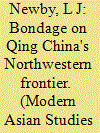

|
|
|
|
|
| Publication |
2013.
|
| Summary/Abstract |
Despite the extensive literature on global slavery and servitude, human bondage in Xinjiang (Eastern Turkestan) during the eighteenth and nineteenth centuries has been largely neglected. Here bondage did not discriminate between ethnic, racial or religious groups and fulfilled a wide range of social, economic, and political functions, reflecting both the region's geographical position at the edge of Central Asia and its political position-first as a dependency and then as a province of Qing China. This paper discusses the nature of the forms of bondage that emerged in this unique geopolitical setting and suggests that the emancipation of Xinjiang's 'British' slaves at the end of the nineteenth century and the gradual decline of bondage resulted from a convergence of local, regional, and global forces.
|
|
|
|
|
|
|
|
|
|
|
|
|
|
|
|
| 2 |
ID:
121958
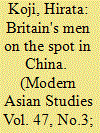

|
|
|
|
|
| Publication |
2013.
|
| Summary/Abstract |
In this paper I examine British policy towards the Yuan Shikai government in China between 1912 and 1914 through a consideration of the role of Britain's 'men on the spot' in China (i.e. British diplomats and bankers resident there). In doing so, I synthesize two bodies of literature that rarely interact: British imperial history and work by China historians. Three main elements shaped British policy in China: first, British policy-makers were determined to support Yuan Shikai's consolidation of power in China; second, in the making of its China policy, the Foreign Office relied heavily on Britain's men on the spot; and, finally, these men were anxious about the vulnerability of the Yuan Shikai government and were therefore manipulated to a certain extent by Chinese politicians. I suggest that British policy-makers were reacting to, rather than controlling, Chinese politics and that in this period collaboration with British imperialism was a rational choice for the Yuan Shikai government.
|
|
|
|
|
|
|
|
|
|
|
|
|
|
|
|
| 3 |
ID:
121964
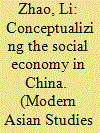

|
|
|
|
|
| Publication |
2013.
|
| Summary/Abstract |
This study offers a conceptual analysis of the social economy in China within the context of institutional transition. In China, economic reform has engendered significant social changes. Accelerated economic growth, privatization of the social welfare system, and the rise of civil society explain the institutional contexts in which a range of not-for-profit initiatives, neither state-owned nor capital-driven, re-emerged. They are defined in this research as the social economy in China. This study shows that although the term itself is quite new, the social economy is no new phenomenon in China, as its various elements have a rich historical tradition. Moreover, the impact of the transition on the upsurge of the Chinese social economy is felt not only through direct means of de-nationalization and marketization and, as a consequence, the privatization of China's social welfare system, but also through various indirect means. The development of the social economy in China was greatly influenced by the framework set by political institutions and, accordingly, legal enabling environments. In addition, the link to the West, as well as local historical and cultural traditions, contribute towards explaining its re-emergence. Examining the practices in the field shows that the social economy sector in China is conducive to achieving a plural economy and an inclusive society, particularly by way of poverty reduction, social service provision, work integration, and community development. Therefore, in contemporary China, it serves as a key sector for improving welfare, encouraging participation, and consolidating solidarity.
|
|
|
|
|
|
|
|
|
|
|
|
|
|
|
|
| 4 |
ID:
121953


|
|
|
|
|
| Publication |
2013.
|
| Summary/Abstract |
This paper offers a gendered perspective to British domination in India through the British Indian Army-which in many ways was central to their entire structure of economic and political domination in India. Locating its understanding drawn from the political economy of south-east Punjab, it argues that the designated martial castes and military recruitment structurally and ideologically identified with and privileged those trends of existing masculinities in this region which suited their power structure and empire building. It was a constellation of marital caste status, land ownership, dominant caste syndrome and good bodily physique or physical strength that ideologically came to connect and configure dominant masculinity in colonial Punjab. An Army profession fully supported it. During the two world wars it emerged as the militarized masculinity, amply supported by legal and administrative measures introduced or apparently adopted in deference to certain popular cultural practices. The associated economic and political privileges turned 'loyalty' into an inherent and special ingredient of 'masculinity' which the nationalists had to confront and deal with till such times that it came to be firmly linked with nationalism and patriotism.
|
|
|
|
|
|
|
|
|
|
|
|
|
|
|
|
| 5 |
ID:
121961


|
|
|
|
|
| Publication |
2013.
|
| Summary/Abstract |
Digital telecommunication technology has expanded the potential of the mobile phone to be used increasingly as a weapon against authoritarian rule and censorship. Since the content of mobile communication is unpredictable and unregulated, mobile phones have the capability to breach state-sponsored blockage of information. This in turn helps the Chinese people to maintain contact with each other, receive information from outside the country, and make political waves in an aggressive battle for control over information. This paper examines spontaneous mobilization via mobile phones, with a focus on two concrete popular protests in rural and urban areas, demonstrating how Chinese citizens have expanded the political uses of mobile phones in their struggle for freedom of information flow, social justice, and the rule of law, while seeking to build an inexpensive counter-public sphere. These processes destabilize China's conventional national public sphere by shaping political identities on an individual level as well as the notion of citizenship within the evolving counter-public sphere. The political significance of mobile phones in the context of contemporary China's political environment can be observed by various social forces that communicate their struggles with the aid of this technology, pose challenges in governance, and force the authorities to engage in new kinds of media practices.
|
|
|
|
|
|
|
|
|
|
|
|
|
|
|
|
| 6 |
ID:
121954


|
|
|
|
|
| Publication |
2013.
|
| Summary/Abstract |
This paper contributes to the history of 'criminal tribes', policing and governance in British India. It focuses on one colonial experiment-the policing of Moghias, declared by British authorities to be 'robbers by hereditary profession'-which was the immediate precursor of the first Criminal Tribes Act of 1871, but which so far altogether has passed under historians' radar. I argue that at stake in the Moghia operations, as in most other colonial 'criminal tribe' initiatives, was neither the control of crime (as colonial officials claimed) nor the management of India's itinerant groups (as most historians argue), but the uprooting of the indigenous policing system. British presence on the subcontinent was punctuated with periodic panics over 'extraordinary crime', through which colonial authorities advanced their policing practices and propagated their way of governance. The leading crusader against this 'crisis' was the Thuggee and Dacoity Department, which was as instrumental in the 'discovery' of the 'Moghia menace' and 'criminal tribes' in the late nineteenth century as in the earlier suppression of the 'cult of Thuggee'. As a policing initiative, the Moghia campaign failed consistently for more than two decades. Its failures, however, reveal that behind the façade-anxieties over 'criminal castes' and 'crises of crime' stood attempts at a systemic change of indigenous governance. The diplomatic slippages of the campaign also expose the fact that the indigenous rule by patronage persisted-and that the consolidation of the colonial state was far from complete-well into the late nineteenth century.
|
|
|
|
|
|
|
|
|
|
|
|
|
|
|
|
| 7 |
ID:
121956
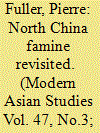

|
|
|
|
|
| Publication |
2013.
|
| Summary/Abstract |
This paper makes the case that in China's most severe food crisis of the first quarter of the twentieth century-the great north China famine of 1920-1921-considerable life-saving relief was generated by three largely-neglected segments of Chinese society: Buddhist and other native charity efforts working along parallel social channels to the better-publicized missionary and international relief groups; the Republic's much-maligned military establishment; and officials and residents of the stricken communities themselves who were operating largely 'below the radar' of the distant, mostly city-based chroniclers of the famine whose voices have been privileged in the later history-writing process. Despite the recent fall of the Qing and the beginnings of a fractured era of warring between provincial governors, this paper suggests that communities in the increasingly neglected periphery of 1920 north China were significantly more viable and attentive to social welfare needs than has been previously recognized.
|
|
|
|
|
|
|
|
|
|
|
|
|
|
|
|
| 8 |
ID:
121955


|
|
|
|
|
| Publication |
2013.
|
| Summary/Abstract |
As viceroy of India (1899-1905), George Curzon believed that unprovoked British assaults on Indians undermined the colonial state's authority to rule. These collisions1 challenged Curzon's conception of moral empire and called into question one of the most important representations of British moral character-that of 'officer and gentleman'. Aware of the strength of indigenous feeling in India and of liberal discontent at home, the viceroy engaged in what appears to have been a laudable defence of the rights of Indians. By doing so, he certainly risked the hostility of official and unofficial opinion in both Britain and India. The fundamental issue was: should the Raj be based on a ruling moral authority administered by men of character, in which collisions were reprehensible, or did it ultimately rest on force?
|
|
|
|
|
|
|
|
|
|
|
|
|
|
|
|
| 9 |
ID:
121957


|
|
|
|
|
| Publication |
2013.
|
| Summary/Abstract |
In the wide domain of finance, taxation is one of the issues to which public opinion is most sensitive. This paper explores why tax reform was hotly debated in Japan throughout the 1920s, focusing on the policies of the two main political parties. Though a topic rarely treated by historians, this controversy reveals a wealth of information on the concerns that lay behind policy choices in years that were marked by economic instability and social unrest; it shows, in particular, how the ruling elites tried to attenuate class conflict by enhancing the redistributive function of taxes, which had thus far been subordinated to the encouragement of rapid economic growth and the financing of state investment. While these attempts deserve attention as tentative steps towards the development of a welfare state, their limits indicate that the parties, in spite of extending the suffrage during this period, retained strong links with a restricted network of established constituents. This paper dwells especially on the earliest and least studied phase of the dispute on tax reform, in order to prove that the emergence of distinct party platforms did not stem simply from tactical considerations, but was rooted in broader policy visions.
|
|
|
|
|
|
|
|
|
|
|
|
|
|
|
|
| 10 |
ID:
121959
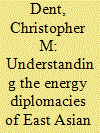

|
|
|
|
|
| Publication |
2013.
|
| Summary/Abstract |
Energy security is one of the major global challenges of the twenty-first century. Intensifying competition for ever scarcer forms of conventional energy resources is causing significant tensions in the international system. East Asia will have a more profound impact on global energy security than any other region as its burgeoning demand for energy fuels, spurred principally by China, is expected to continue growing at over twice the world average in the next few decades. This paper examines the reasons why we may expect the energy diplomacies of East Asian states to become an increasingly salient feature of East Asian states' foreign policy and international relations in the foreseeable future, and thereby significantly shape the nature of the region's international political economy. It presents a framework of energy diplomacy analysis in order to better understand how East Asian states are formulating their energy diplomacy strategies and actions. The four prime elements of this framework comprise: empirical perspectives and generic task-oriented terms; agential influences on the formation and organization of energy diplomacy practice; the energy-development nexus; and transaction mechanisms of energy diplomacy. The main conclusions are first, mercantilist approaches to energy diplomacy will persist but continue to gradually give way to market institutionalism; second, energy diplomacy will become increasingly linked to other forms of diplomacy, such as trade, environment and development assistance; third, we may expect East Asian states to afford greater priority to multilateral energy co-operation both regionally and in a wider international or global sense as energy security interdependencies deepen; and fourth, East Asia's growing reliance on sourcing energy fuels from outside the region will make it more dependent on stable international energy markets-these markets are becoming increasingly internationalized and globalized, which will broaden the future options of East Asian states developing new international energy partnerships.
|
|
|
|
|
|
|
|
|
|
|
|
|
|
|
|
| 11 |
ID:
121963


|
|
|
|
|
| Publication |
2013.
|
| Summary/Abstract |
This paper sheds light on the long-distance politics of a small and rather young diaspora-the Acehnese overseas-which proved to be very influential on homeland politics despite its relatively small size, especially with regard to the separatist conflict in Aceh, Indonesia. Special attention is therefore given to the close connections between the politicized migrant population overseas and their involvement back home. Born out of the suffering of people in Aceh and in Malaysia-the main destiny for refugees-the Acehnese overseas started to organize informal associations and networks to foster mutual support. During the almost 30-year-long conflict, material, financial, and other forms of support were directed not only to members of the diaspora, but also to people in Aceh, as well as the separatists, which enabled them to continue their struggle for Aceh's independence from Indonesia. Unlike larger conflict-generated diasporas that can afford to send home large sums of money, the Acehnese diaspora's greatest strength was the ideological and moral support they provided to people back in Aceh. The evolution of the diaspora and its activities were closely linked to developments in the homeland. By emphasizing the dependence of diasporas on homeland developments, which dictates the level of their political engagement, this paper draws attention to the diaspora's support for both the perpetuation of conflict and conflict resolution. After the end of the conflict in 2005, the diaspora lost its prominent role, and became involved in rudimentary forms of long-distance engagement.
|
|
|
|
|
|
|
|
|
|
|
|
|
|
|
|
| 12 |
ID:
121962
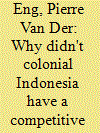

|
|
|
|
|
| Publication |
2013.
|
| Summary/Abstract |
This paper quantifies the consumption and production of cotton textiles at different stages of processing in Indonesia during the Dutch colonial era (1820-1941). It discusses the main factors that impeded the development of an internationally competitive cotton textile industry, and concludes that production in the industry increased significantly in Java during 1820-71, and again during 1874-1914 and 1934-41. However, most activity involved finishing of imported cotton cloth to suit local preferences. Spinning and weaving increased only marginally, as domestic production was precluded by the high-labour intensity of small-scale production, marginal local raw cotton production, and competitive international markets for yarn and cloth. Unfavourable and fluctuating real exchange rates discouraged investment in modern spinning and weaving ventures until trade protection and technological change in small-scale weaving caused rapid growth of domestic production after 1934.
|
|
|
|
|
|
|
|
|
|
|
|
|
|
|
|
|
|
|
|
|